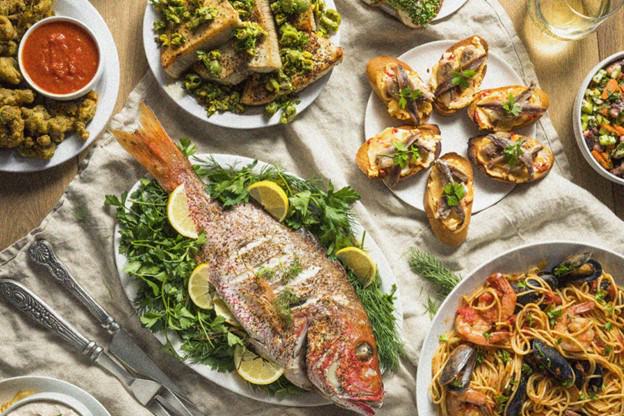The Christmas Season is upon us! This is my favorite time of the year; trimming your Christmas tree, hanging your decorations and most importantly, spending time with those you love. Christmas Eve was a big tradition in my home growing up and I am happy to carry this on with both my family and my husband, Anthony’s family.
Celebrations filled with food and opening presents are some of my best childhood memories. I can relive those moments now with my nieces, nephews, and my wonderful Godchildren. I am so excited to see all their eyes as they tear into that paper on Christmas morning. We are especially excited to see our newest nephew Gianluca Remo enjoy Christmas with his cousins. I feel so fortunate to have family and friends in my life and wish all of you the best Christmas season.
On behalf of my family and staff at La Gazzetta we thank you for your support for our publication. We would not be able to do what we do without you. If you have a passion for writing and are looking to join our newspaper staff, please contact our Editor at This email address is being protected from spambots. You need JavaScript enabled to view it..
The publication continues to grow, and we know that would not be possible without all our loyal readers and advertisers. We look forward to hearing from you.
Please enjoy this article from December 2018 titled “The Feast Seven Fishes” from one of our writers William Giovinazzo. Buon Natale!
Not another article about the Feast of Seven Fishes!! Well, be patient with me for a bit, I have something a little different to say about this particular tradition.
Recently, I had been asked how important my Italian heritage is to me. My Italianità, I answered, is essential to who I am; I would not be me without it. It shaped how I look at the world. We all have memories of common life events; our first day at school, high school graduation or our first apartment. Mine are all flavored with my Italian American upbringing, as I am sure are the memories of so many other Italian Americans. While the Norman Rockwell image of childhood summer may be going down to the ol’swimmin hole, my dearest summer memories are of the St. Agnes feast and their sausage an’pepper sangwidges.
My Christmas memories are also different from most A-mare-i-ghans. As the holiday approached, visions of sugar plums may have danced in the heads of the kids in South Utica, the non-Italian side of my hometown, but baccala and calamari swam across my imagination. When other people are visited by the Ghost of Christmas past they no doubt think of Christmas morning, beautifully wrapped packages, or, for those of us who are baby-boomers, “Mr. Magoo’s Christmas Carol.” This is not the case for me, Christmas is Christmas Eve which was, and is, the most important night of the year, at least to me.
I wish I were one of Dickens’ ghosts so that I could take you back to my childhood Christmas Eve. The day before Christmas was a flurry of activity. All day long relatives and neighbors would stop by to share their holiday wishes. My dad would receive them at the kitchen table with a little espresso and a Stella D’oro cookie or two, occasionally offering a shot of anisette. My mother and sister typically used two kitchens to prepare our Christmas Eve meal; like many Italian Americans, we had a second kitchen in our basement. For the most part, the house was filled with the wonderful smells of my mother’s cooking, but only for the most part. Every year, not long before the meal was to begin, what I could only describe as a horrible, choking stench infiltrated every corner of the house. There was no escaping it.
Rather than salad, my mother began the dinner with a bowl of aglio olio. The remainder of the meal was the typical Christmas Eve menu found in so many Italian American homes; stuffed calamari, stuffed mussels, anchovies, baccala, scallops, and fried fennel. Some years my mother would make shrimp, clams or even snails. After the main course, before dessert, there was a bit of rest, a lull in the eating. While the women cleaned the table and got a jump on some of the dishes, my father held court sharing with the other men stories of the old days. Eventually, once the women returned, we would have dessert as we talked late into the night. The television was off. There was no Christmas music playing in the background. It was just the family talking, telling stories of the old days.
Although our celebration was a typical Italian American Christmas Eve, you will notice there is one thing missing from the stereotype. We never called it the Feast of the Seven Fishes. We referred to it as the fish. We would say things like; we are making the fish this year or we had the fish for Christmas Eve. We all knew what it meant. It wasn’t until I was an adult that I heard the expression, the Feast of the Seven Fishes. I admit when I first heard this expression, I worried that I didn’t know my own culture. So, I started to do some research.
Italy’s culture is so diverse with each region, and in some cases even towns, practicing their own traditions it is difficult to really say that something is genuinely Italian or not. However, I have no Italian friends who actually practice the tradition of the Feast of the Seven Fishes. Although I have heard reference to some places in Southern Italy that have a traditional meal of 13 different types of fish, one for each of the 12 apostles plus one for Jesus. I have also heard others talk of nine fishes. If the Feast of the Seven Fishes is practiced in Italy it is certainly not as widespread as it is in the U.S.
This lack of consistency as well as conditions in southern Italy, especially during the Italian diaspora when most Italian immigrants came to the U.S., causes me to suspect that the tradition is an American creation. Southern Italians were poor, barely able to survive. Simply read Carlo Levi’s “Christ Stopped at Eboli” to get a sense of the desperate conditions in which our people lived. Most immigrants back then were from the south where hunger was so well-known it was like a member of the family. One account of life in the south describes how women would scrape plaster from the walls to mix with dough to make up for the lack of flour. Does it make sense that people living in such circumstances would host a huge feast?
Once in America, the lives of Italian immigrants changed dramatically. Although poor by American standards, they had access to a much greater variety and quantity of food than they had in Italy. Just as an organism evolves to thrive in its new environment, Italian American food customs evolved in this new world of plenty. More meat was introduced into Italian cooking, for example. It is, therefore, reasonable to suspect that a feast involving so many different types of fish was not brought over with us on the boat, but something that really evolved here in the U.S.
Do I mean by this that we should stop observing the Feast of the Seven Fishes? No, not at all.
What is important about the feast is not whether we prepare seven or nine or even 13 different types of fish. To me, the most important part of the meal, the best part of the meal, is at the end when the stories of the old days are told. As Italian Americans, we cannot let our culture die out, we cannot let our children grow up thinking the national restaurant chains or the canned, processed foods they see on grocery store shelves represent our culture. We don’t want them thinking “The Godfather” or “The Jersey Shore” are representative of our values. We need to teach them what it really means to be Italian American. This is what is important about the Christmas Eve meal. When we share with them the stories of those who have gone before us, stories of the hard-working Italian immigrants who built this country, we are teaching them what it means to be Italian American.
So, this Christmas Eve, make a little aglio olio and fry some baccala. Maybe go full-out and make seven different types of fish, but whatever you decide to do make sure you share with your family the most important part of the Feast of Seven Fishes. Make sure you share with them our Italianità.




